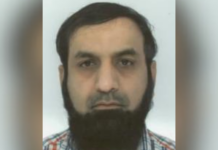US intelligence agents appear to have influenced a decision to investigate charitable donors to CAGE, the advocacy group that campaigns on behalf of people accused of terrorism, describing it as a “jihadist front”, The Guardian reports.
Just days before the Charity Commission intervened to choke off future funds from the voluntary sector to CAGE, its chair, William Shawcross, a former journalist who in the past has defended torture and Guantánamo Bay, emailed fellow board members to warn that CAGE was a “terrorist supporting group.”
Documents laid before a London court today reveal that in an email, dated 27 February 2015, Shawcross says he had “spent the last 24 hours in Washington with senior US government counter-terrorism officials” and that “one senior analyst thought it was astonishing that CAGE was not long ago exposed for what it is – a jihadist front.”
Shawcross continued: “We must be robust and, where possible, be seen to be robust, to protect the reputation of the sector as well as ourselves.”
A few days later one charity, which had given almost £270,000 to CAGE, said it had come under “acute regulatory pressure” to cut off future funding. The Charity Commission said that officials had received the emails from the board but denied they had influenced any operational decisions.
The revelations were contained within evidence in a key case heard on Wednesday in the High Court by the lord chief justice. The case was brought by CAGE against the charity regulator and at the heart of the legal arguments is whether charities have a right to fund unpopular causes.
Lawyers for CAGE claim that the Charity Commission exceeded its remit in seeking – and getting – assurances from the pressure group’s charity backers that they would not in the future fund its work. The Charity Commission denies that it sought undertakings on this basis.
Subscribe to our newsletter and stay updated on the latest news and updates from around the Muslim world!

The commission had allegedly overstepped its powers by asking two charities – the Joseph Rowntree Charitable Trust (JRCT) and the Roddick Foundation – to pledge never to give money again to CAGE.
JRCT funded Cage with £270,000 between 2007 and 2014, and the Roddick Foundation granted the organisation £120,000 between 2009 and 2012.
The stakes are high. CAGE, which has operated without a bank account for 18 months, could be forced to declare bankruptcy if it loses the case.
The JRCT, which donated about 0.8% of its total annual grant to CAGE, claims it came under “acute regulatory pressure” to make this promise. Helen Mountfield QC, acting for the charity, said that the trustees had defended the payments to fund “controversial activities.”
“[JRCT] does not agree with every action or statement of every group that it has funded, but considers that engaging with a range of groups is a way to ‘search out the underlying cause’ of the problems which face the world, the cause for which [Quaker philanthropist] Joseph Rowntree intended his donation to be used.”
Although the JRCT had “serious doubts over the legality” of the regulator’s actions, it finally acceded to the regulator’s request. However, it applied to join the case as an interested party and was given permission by the courts. It now contends that that the way the commission went about its “robust regulatory action” was unlawful.
Mountfield referred to the email exchanges from board members to the head of investigations and to the chief executives as “trenchant” and “tendentious”. “There were somewhat tendentious emails from members of the board,” she told the court. “[Charity Commission] officials, however, say they took the decisions independently.”
The presiding judge, Lord Thomas of Cwmgiedd, accepted that “a great deal of passion had been aroused” but the bench would focus on the “press statement by the Charity Commission”, which had clearly shown that charities had given assurances that they had “ceased funding CAGE and will not be doing so in future. This is what the Charity Commission said to the world about what it has done.”
The Charity Commission denies that it acted outside of the law and said it had sought “voluntary assurances [which were] plainly within [its] powers”. “Such assurances were needed in order to maintain public trust and confidence in charities.”
In its defence document the regulator denies that it directed charities to give an unprecedented pledge to rule out future funding for CAGE “regardless of any circumstance.”
The commission said it intervened because of the public outcry when CAGE suggested Mohammed Emwazi, believed to be the Islamic State executioner known as Jihadi John, had been radicalised in part by Britain’s intelligence services.
 Emwazi had sought the campaign group’s help as a student in London between 2009 and 2012 telling CAGE he had been harassed by the security services.
Emwazi had sought the campaign group’s help as a student in London between 2009 and 2012 telling CAGE he had been harassed by the security services.
CAGE argues that the commission overstepped its powers in acting the way it did, arguing the regulator has “no powers” to make requests of charities to stop payments ever to any group on the basis that there might be “reputational damage” to the charitable sector “due to public reaction”.
David Gottlieb, the barrister acting for CAGE, explained: “If it does … the commission may in future be forced to advise or guide charities not to carry out charitable work which is deeply unpopular at the time.”
The cache of emails presented as evidence to the court reveals a commission deeply troubled by the charities’ association with CAGE combined with a respect for the pressure group’s professional talents.
In one email Shawcross describes CAGE and its outreach director Moazzam Begg as experts in “lawfare” – a term coined to describe the use of a country’s legal system to undermine its defences.
“CAGE and Begg are both awful – and, like all Islamists, are very skilled at lawfare, in particular libel litigation.”
In a skeleton argument, Julian Milford QC, acting for the commission argues that the materials produced by the pressure group in the wake of the Emwazi affair “evince a disturbing and distorted view of the world, likely to be seen as offensive by the vast majority of the British population.
Nowhere in any of them is it suggested that Mr Emwazi should bear any responsibility for his own actions. Mr Emwazi, and indeed Michael Adebolajo, the murderer of Fusilier Lee Rigby, to whom Mr Emwazi is compared, are presented as victims. On those materials, it may be readily seen why commentators called [CAGE] an ‘apologist for terror.’”
This view of CAGE permeates many of the documents in court – and leads to a number of exchanges between officials at the regulator and board members.
Over a week of internal discussions Shawcross justifies his assertions that charities are “funding a front for jihadist terrorists” in an email to Michelle Russell, the commission’s head of investigations, by pointing to support from writers such as the historian Michael Burleigh.
On 1 March Shawcross emails the board referring to “another compelling article on the true nature of CAGE”. Written by Andrew Gilligan, the piece in the Daily Telegraph claimed CAGE were “extremists peddling lies to British Muslims to turn them into supporters of terror.”

In the email Shawcross says “charities surely cannot fund bodies that are acting against the national interest … Surely we can say that any charity supporting CAGE has clearly not done due diligence and has put its own reputation and that of the sector at risk?”
Shawcross also appears to have received support for his claims regarding CAGE by fellow board members: Orlando Fraser – who was once a Tory parliamentary candidate, Peter Clarke, former head of the Met’s anti-terrorist branch, and historian Gwythian Prins, a member of the chief of the defence staff’s strategy advisory panel.
All express some degree of exasperation that the regulator was not able to act against charities that had previously been funding CAGE.
In an email on 1 March this year, Clarke asks Russell, the commission’s head of investigations: “Is it legitimate for a donating trust (JRCT) to pick and choose in this way? It seems very strange to me that a charity could seek to justify donations to a largely odious organisation by saying that one small part of its work might be claimed to be charitable.”
Reference was also made to the fact charities both acceded to the demands of the regulator after, the court documents show, a cabinet minister made a “formal complaint” to the charity commission about CAGE.
On 2 March Theresa Villiers, the Northern Ireland secretary, wrote to Shawcross saying: “It is wholly unacceptable for charities supported by the taxpayer (through the generous tax treatment afforded to all charities) to be funding an extremist group like this one.”
Shawcross replied on 6 March to the Tory MP saying that “both the Roddick Foundation and The Joseph Rowntree Charitable Trust have ceased funding CAGE and will not be doing so in the future”.
The case continues.






















